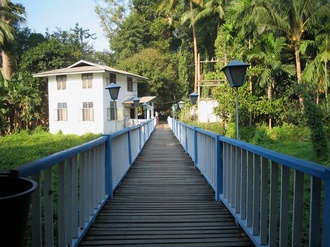Meditation Retreats Myanmar
Meditation Retreats Myanmar
Dhama Jhoti, Myanmar Vipassana Meditation Centre, Bahan Township, Yangon
 Image Courtesy Dhamma Joti Centre
Image Courtesy Dhamma Joti CentreDhama Jhoti was opened in October 1993 and is spread across a 12 acre site, a third of which is covered by a lake. Many of the Myanmar meditation centres are in busy towns like Rangoon and so if it is tranquility you are looking for, they are not for you. However, Dhama Jhoti has this peace and tranquility being set in its own grounds.
The main hall can seat 150-200 students. There are 2 double-storey dormitories, one for male and one for female students. In addition, the centre now has 19 double rooms with attached baths for males and 20 single and 10 double rooms with en suite bathrooms for females. So if sharing is not your thing, this can be accomodated.
Vipassana means to "see things as they really are". It is process of self-purification by self-observation. While rediscovered by Gotama, the Buddha 2,500 years ago, Vipassana can be practised by anyone without conflict with their existing beliefs or religions.
The main course is a 10 day residential course regarded as the minimum period in which a person can fully appreciate the benefits of Vipassana meditation. Courses are run on a donation basis only as there is no charge for the course, the food or even the accomodation. The cost of the course is provided by former students of the Centre wishing others to have the benefits of Vipassana meditation. No person involved in teaching Vipassana is remunerated.
Vipassana has been handed down through an unbroken chain of teachers. Originating in India, the current living teacher of this method of meditation, S.N. Goenka was born and raised in Myanmar. He settled and began teaching Vipassana in 1969 and since then has taught tens of thousands across the world. In 1982 he started to appoint teachers to help him teach Vipassana throughout the world.
The first part of the course involves abstaining from killing, stealing, sexual activity, speaking falsely and intoxicants. I would hope that my fellow meditators would not be wanting to bury a knife in my back as I meditate and I cannot imagine I would have much with my worth stealing.
The next part of the course involves gaining mastery over the mind by focusing on the natural process of breathing. Walking meditation which may also be used involves focusing on each step as you take it. This is very challenging and do not underestimate how challenging this will be over the course of 9 odd days. The Centre says that by the fourth day the mind will have calmed sufficiently to start observing the sensations of the body and the thoughts which come into our minds. This mind of the observer is at the core of Vipassana meditation. On the last day of the course, you learn the practice of loving kindness or goodwill to all beings in which the purity learned in the previous days is shared with all human beings.
Back to main meditation retreats page
New! Comments
Have your say about what you just read! Leave me a comment in the box below.